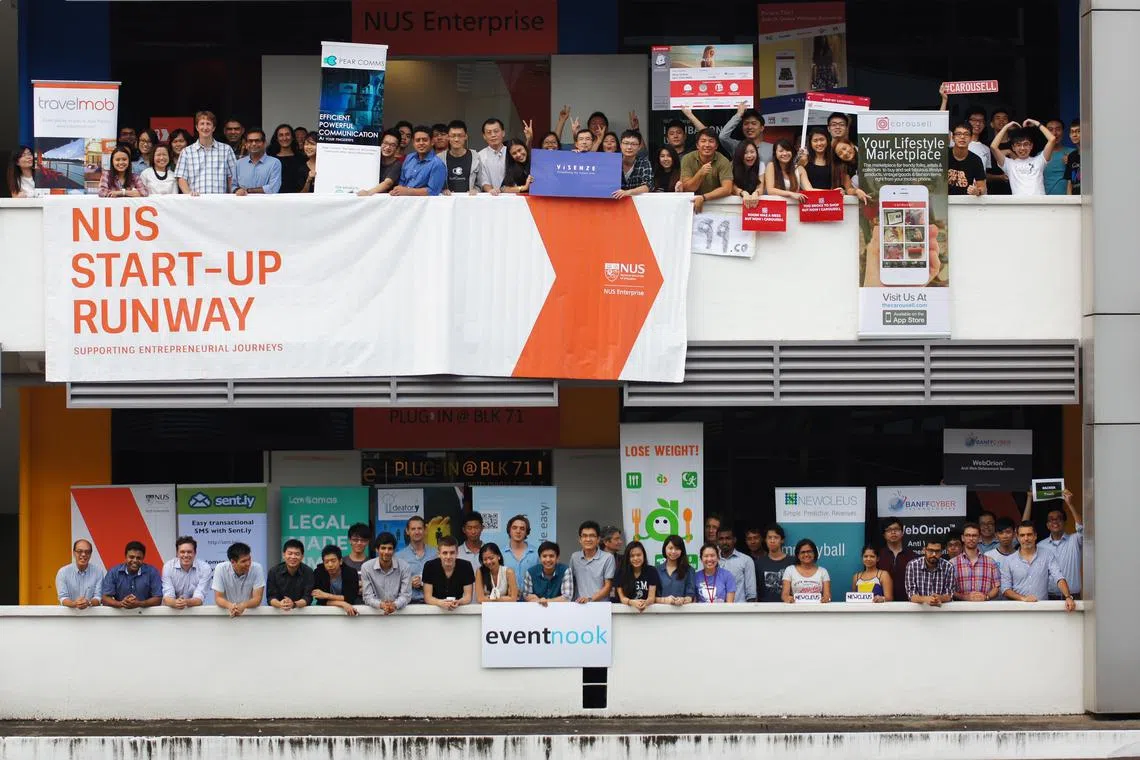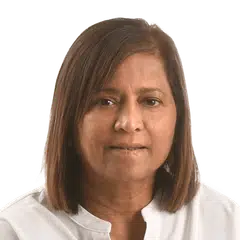NUS to expand entrepreneurship programme that has created unicorns
Sign up now: Get ST's newsletters delivered to your inbox

Block 71 in Ayer Rajah (seen in this photo from 2014) is one of the incubation spaces that NUS offers its student start-ups.
PHOTO: NUS ENTERPRISE
SINGAPORE - A programme credited with seeding the start-up community in Singapore is being expanded.
The National University of Singapore Overseas Colleges (NOC) programme, which sees students going to work in start-ups in more than 15 locations abroad, will cater to more students – gradually expanding its current annual capacity of 300 to 600 in five years.
While the programme already sends students to places such as Silicon Valley, New York, Stockholm, Tel Aviv and Shenzhen, the National University of Singapore (NUS) will add more business and innovation nodes in the United States, Europe, China and South-east Asia.
Among the new destinations in Europe is Paris, where the first batch of 20 NOC students will go in January 2023. The city was picked for its start-up ecosystem in Europe, and for reinventing retail and the food industry through technology.
NUS president Tan Eng Chye said the new locations will be aligned to industries of strategic value to Singapore, and the hope is that NOC will produce talent who can innovate within those areas. This means offering a more thematic approach within certain locations and plugging into their specific strengths, be it artificial intelligence (AI) in Toronto, medtech in Boston, maritime tech in Norway, or agritech and food tech in the Netherlands.
Professor Tan highlighted agritech and aquaculture technologies, which are among the areas that NUS wants to contribute to in terms of producing research and talent who will innovate in the field.
He said: “Considering our space and resource constraints, Singapore is vulnerable to external developments in the global food supply chain – hence the ‘30 by 30’ goal to produce 30 per cent of the population’s nutritional needs locally by 2030.”
The expansion plans come one year after two NOC student start-ups – Carousell and PatSnap – attained “unicorn” status in 2021, reaching US$1 billion (S$1.4 billion) in valuation. Before 2021, several NOC start-ups made successful exits after being bought up for millions of dollars. They include tenCube, which made $25 million for its founders in 2010, and Zopim ($37 million) four years later.
Prof Tan said NOC has historically been exclusive to NUS, but recognising the synergy that can occur when different communities come together, the university is opening the programme to students from other institutions. In 2022, three Singapore University of Technology and Design students were the first external participants admitted to the programme.
“Many of our NOC alumni entrepreneurs met their co-founders while on the programme, so we expect to see cross-institutional start-ups emerging as a result,” Prof Tan added.
NUS is also looking to draw more of its postgraduate research students. Prof Tan said several PhD students have seized the opportunity presented by the Graduate Research Innovation Programme. It was launched in 2018 to guide postgraduate students on turning their research ideas into inventions, using them to create deep-tech start-ups based on cutting-edge technologies to solve urgent problems.
NUS currently has more than 10,000 students pursuing PhDs and master’s degrees, he added, noting that many research students, especially in fields such as engineering, science and technology, often work on breakthrough technologies for their theses. Their ideas and inventions can be developed further and taken to market.
Prof Tan said NUS Enterprise, the entrepreneurial arm of the university, will further build up its ecosystem to support local and global start-ups by students. For instance, Block71, an incubation and networking space first set up in a retrofitted flatted factory in Ayer Rajah, has also been set up in San Francisco, Jakarta, Bandung, Yogyakarta, Ho Chi Minh City, Suzhou and Chongqing. NUS is now eyeing a similar move in Guangzhou and Nagoya.
The different locations of Block71 offer more than just space. They also provide a range of services, including mentorship with entrepreneurs to help the students tap start-up communities around the world, said Prof Tan. He noted that The Economist magazine referred to Block71 as the heart of Singapore’s technology start-up ecosystem and “the world’s most tightly packed entrepreneurial ecosystem”.
Professor Shih Choon Fong, who launched the overseas colleges in 2002 when he was NUS president, said it is important that NOC is renewed to suit the times.
“Twenty years on, the world is a different place... There are many new entrepreneurial nodes in the world and profit is not the only objective, but also social inclusion and sustainability,” he said.
“NOC needs to be renewed once again. It will need new leaders, new vision, new ideas, but above all, it needs to re-envision the challenges and opportunities posed by a different world.”



